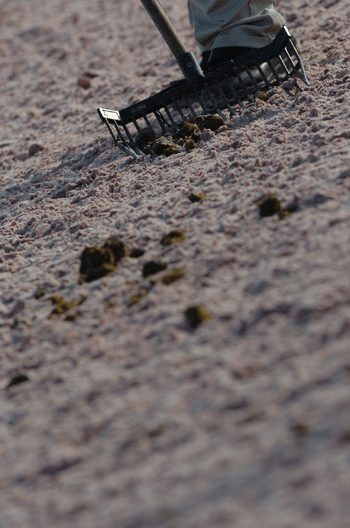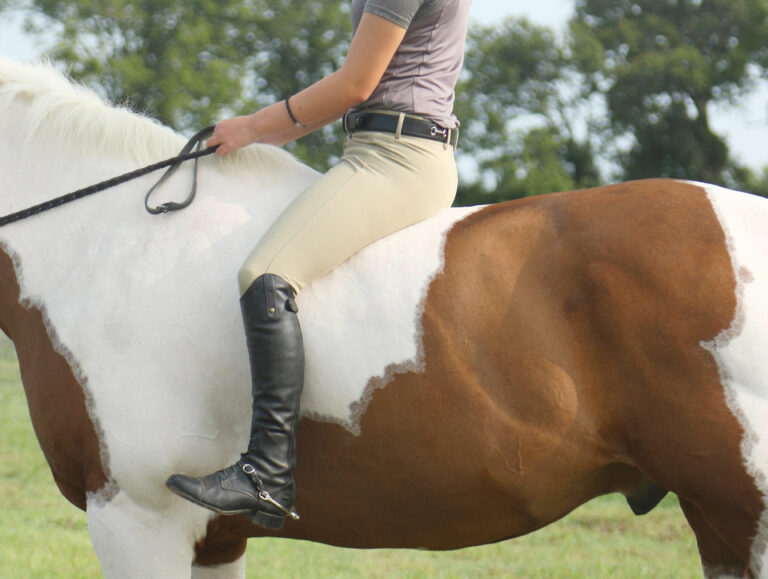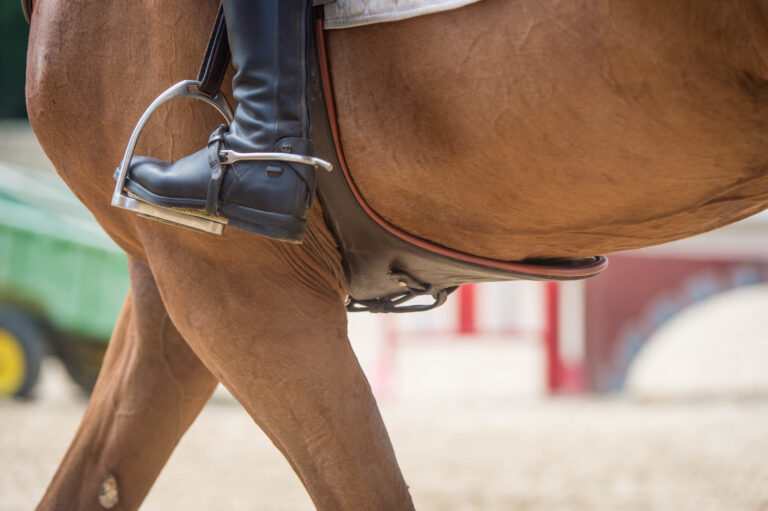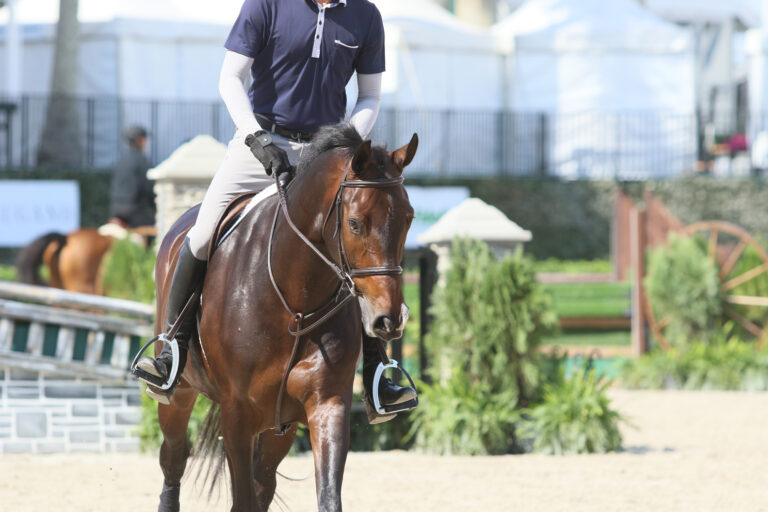Q: I lease a mare who often stops in the middle of a command or even just while we’re trotting or walking around to stomp, kick or bite at flies. I hate having to pull her head up and kick her forward 20 times in a half-hour ride. I’m also worried it will affect our flat classes when we show. I fly spray her before every ride and use a fly bonnet. Is there anything else I can do to stop this habit?

TIK MAYNARD
A: The bite of the female horsefly is more annoying than having the first rail down when jumping a course. And the bizzzz-bizz-biz-biz of a cloud of no-see-ums makes it hard to criticize a horse for wanting to gallop off—even I want to get away from them. I say all of this because seeing things from your horse’s point of view is a good starting point to avoid getting frustrated with a fly problem. Then you can put your energies into finding solutions.
I suggest a multifaceted approach to your problem. First, set yourself and your horse up for success by doing all you can to avoid flies. Remember that flies are like vampires—they need fluids to survive and reproduce. Remove standing water, even the water from stalls if there are no horses in them. (Unlike vampires, flies have no teeth—the bite you feel is their mandibles cutting the skin so that their tongues can get to the blood.)
Second, stop attracting flies. Clean your stalls, paddocks and rings every
day. Move your manure pit away from the barn and riding arena. Cover it. Put lime in the stalls.
Third, kill the flies you do have with fly traps. If you’re not sure what kind, try a few. There are almost as many fly traps on the market as there are different kinds of flies. You also can try fly predators. These tiny insects kill fly larvae but don’t bug people. And they come by mail in a cute plastic bag.
As you work on getting the fly population at your barn under control, you also need to work on your horse’s focus. I learned the importance of focus in 2007 when I was competing in a modern pentathlon event in Cairo, Egypt. Pressure was high because it was an important competition leading up to the 2008 Olympics. Of course, shooting, my worst event, was the first phase. I remember loading my gun and sweating—the center bull’s-eye was the size of a dime. My arm shook as I tried to focus on the pistol sights, but my attention kept shifting back to a fly that circled my elbow. My eye went back and forth. First the sights were sharp, then fuzzy. The air grew hazy and my eye tired. I had 10 seconds left to shoot. I slowly squeezed the trigger. I steadied my arm. I had five seconds to shoot. The sight sharp … fuzzy … sharp. The fly landed. Three seconds. It was too late to lower the pistol and start again. BAM!
I missed my shot badly—it was about as embarrassing as having your horse jump out of the dressage ring. But here is the interesting part: Top shooters, even with flies on their arms, competition pressure, the heat and hazy desert air, all shot just as well as they normally do. Why? What did they have that I lacked? Focus. They had focus like a tornado.
They had a clear priority in their lives, and it kept their attention. Focus comes from technical expertise, practice and confidence. It is not easy—even Olympic athletes work with sport psychologists to find ways to focus. Focus is partly the ability to live in the moment. The trick is living in the moment you want. A horse worried about flies is living in the fly moment; you want him in the listening-to-you moment.
Are the flies a physical problem? Yes. They are annoying and can be painful. Are they a psychological problem? Yes. Just like a person, a horse who has learned to focus will be able to work through mild discomfort. He will ignore the flies and focus on the task in front of him. Xenophon, that great Greek horse trainer, wrote: “The true test of a leader is whether his followers adhere to his cause from their own volition, enduring the most arduous hardships without being forced to do so and remaining steadfast in the moments of greatest peril.”
Every person and every horse has, consciously or unconsciously, a priority in his or her life all the time. For a horse, the priority is usually safety, comfort, play and food. At the moment your horse is distracted by flies, she is choosing comfort as her first priority, her focus. She is shaking her head to make herself more comfortable. How can you change her priority to get her mind off the flies? Make yourself more interesting than the flies. You can do this by varying your riding. For instance, ride a leg-yield to the left, a canter transition, a trot transition then leg-yield right. Repeat.
Find out how much it takes to be interesting to your horse. Every relationship is different with horses or people. When I hang out with my brother, our best conversations happen on a long run through the woods. When I see my aunt, we trade stories playing Scrabble and sipping tea. A high-energy kid might have to kick a ball around before he can concentrate. For your horse, you have to figure out what kind of work and how much of it allow her to focus on you. Any less and you won’t get her attention, any more and you will be just as annoying or painful as Diptera.
What I like best about working with horses from the ground is that they learn to learn. Learning is about more than what you remember. It’s about socialization, confidence, focus and maturity. Maybe flies are to focus what frustration is to maturity. Don’t punish your horse for shying or being distracted. Instead, get her on the aids. Move her feet, not her head.
Having said all of this, you need to realize that creating enough play to distract your horse from the flies requires tact and experience. It may be a problem that a beginner is not ready to handle. If this is your situation and you don’t have access to a professional and you have competitive goals, you might consider leasing a different horse.
I never shot well in modern pentathlon. In 2008, after watching the Olympics on TV, I switched sports. I work with horses full-time now. Was this quitting or moving on? In the end I am happy. The art is knowing when to stick it out and when to find a different situation. Good luck.
Eventer and natural horsemanship advocate Tik Maynard spent six years on the Canadian National Team competing in the modern pentathlon, which includes riding, pistol shooting, fencing, swimming and running. He competed in the sport at the 2007 Pan American Games, three World Championships and 11 World Cups before focusing his competitive sights on eventing. He was long-listed for the Canadian eventing team for the 2012 London Olympics and currently is long-listed for the national eventing team. He has been a working student for eventers David and Karen O’Connor and Ingrid Klimke, German dressage trainer Johann Hinnemann and natural horseman and cutting trainer Bruce Logan. He also worked as an assistant trainer for show-jumper Anne Kursinski. Recently married to eventer Sinead Halpin, Tik conducts eventing and natural horsemanship clinics throughout the United States and Canada, including the upcoming “Young Horse Development” at The Fork in North Carolina, in November. For more information, go to www.tik.ca.
This article originally appeared in the June 2014 issue of Practical Horseman.











